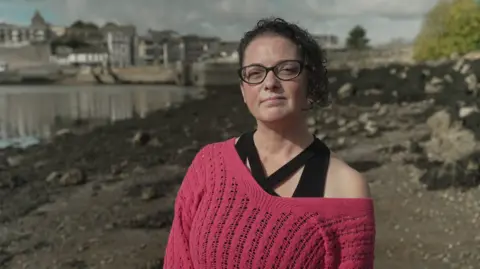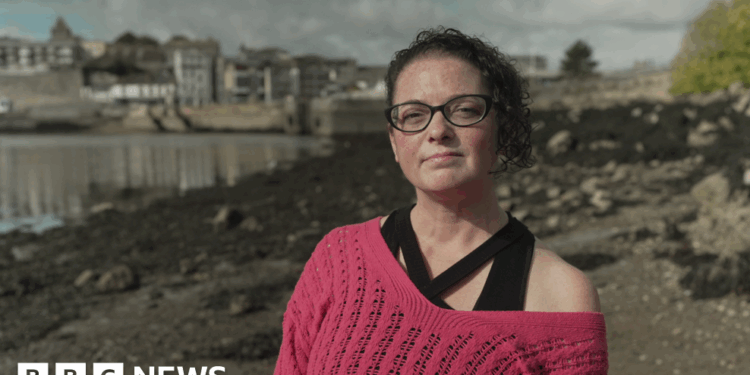 BBC
BBCKelly Pardy was born with juvenile macular degeneration – a visual impairment that affects her central vision.
The impact of the condition became particularly challenging when she became unemployed for a period of time.
However, a referral to a “blue” social prescribing scheme in 2023 run by the Ocean Conservation Trust helped her through this difficult time.
The eight-week nature prescription included snorkelling, rock-pooling and spending time at the National Marine Aquarium in Plymouth.
She said: “I ended up getting quite down because of the difficulties I was encountering, and then I didn’t work for a little while; but I’m delighted to say that I am now working again.
“It gives you some time where your brain can calm and then you can just be able to relax, then it almost clears your mind – a bit like exercise, releasing the endorphins”
Kelly went on to volunteer for the Ocean Conservation Trust and has credited the whole experience with helping her get back into her profession as a chef with a new employer.
In the NHS, these schemes are known formally as “green social prescriptions”.
GPs and health practitioners refer patients to organisations that offer nature-based activities such as hiking, birdwatching, rock-pooling or gardening.
Uncertain future
It is supposed to complement other more mainstream treatments and therapies, and has been a key part of the government’s 10-year plan for the NHS in England.
But the future of green social prescribing is uncertain.
Despite a four-year national pilot that ended back in March being judged a success by an independent evaluation of its first two years, there is concern that the onus for funding these schemes is being left to charities.
Organisations including the Ocean Conservation Trust are calling on the government to commit more funding and to roll them out, beyond their initial seven trial areas.
The charity has spent £25,000 over the last three years on its “blue mind” social prescribing scheme in the south-west of England.
The service has already helped 45 people locally.
Freyja Thomson-Alberts, engagement manager for the Ocean Conservation Trust, said: “We do know it does work. It complements the services and it can have the benefits of preventing.”
The national pilot scheme saw nearly 8,500 people prescribed nature activities in its first two years, with more than half those patients living in socio-economically deprived areas.
Professor Chris Dayson, from Sheffield Hallam University, who was part of the team that evaluated the scheme, said it brought “a really statistically significant increase in wellbeing” for patients.
The evaluation also found the scheme brought an economic social return – not least of all by getting people back into work – of £2.42 for every £1 invested.
The government did not comment on the future of green social prescribing but said the evaluation of the second two years of the trial scheme would be published “in due course”.
Kelly recognised these schemes may not work for everyone but said that, for her, the benefits have been profound.
“It’s something that’s surprisingly helpful and, unless you give it a go, you wouldn’t know,” she said.
Source link : https://www.bbc.com/news/articles/cy7e6y3r805o?at_medium=RSS&at_campaign=rss
Author :
Publish date : 2025-10-14 05:14:00
Copyright for syndicated content belongs to the linked Source.






